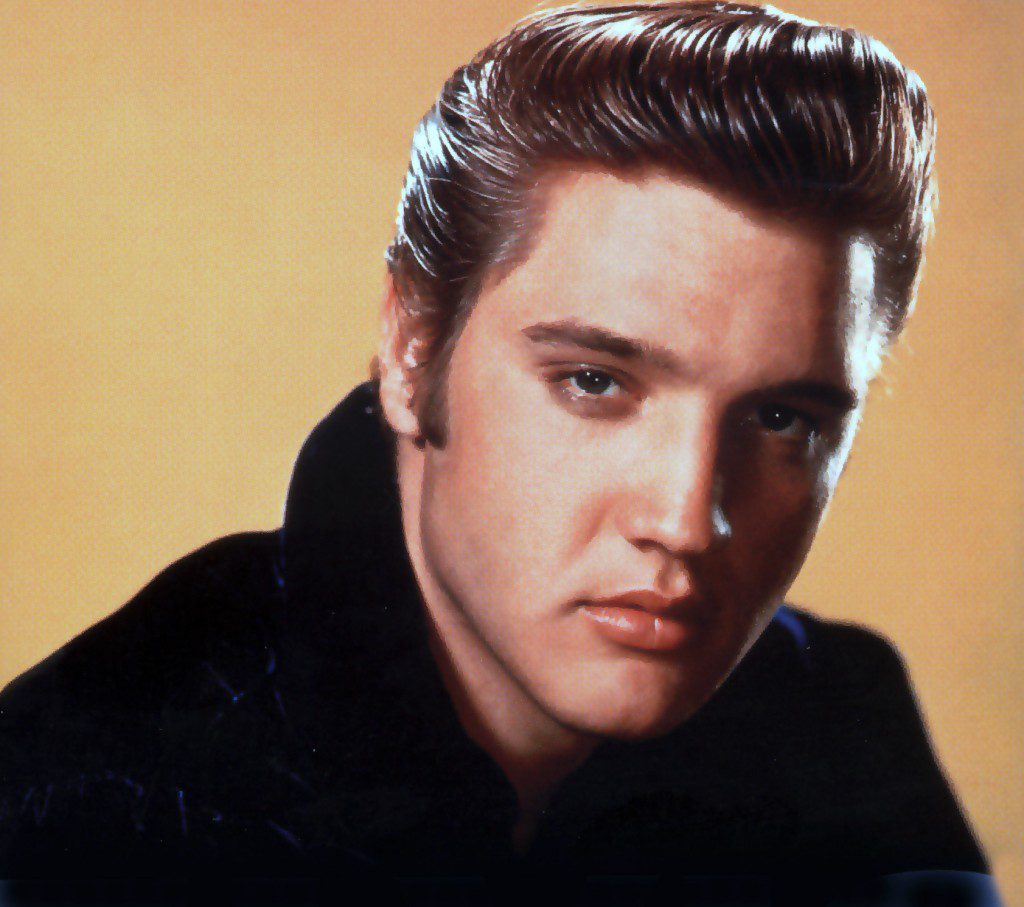Who will release the first Hollywood biographical movie about Elvis Presley? According to the Hollywood Reporter, four productions are in the works — and one of them, The Identical, focuses on the elusive question of Presley’s Christian faith.
Elvis Presley, 1959
Worldwide, the enigmatic Presley sold over one billion records, more than any other artist, according to the website BiographyElvis. He won multiple gold and platinum awards for 131 albums and singles — far more than any other artist. Nominated 14 times for Grammy awards, he only won three — all for Gospel recordings: the album “How Great Thou Art” in 1967, the album “He Touched Me” in 1972 and his live Memphis concert recording of the song “How Great Thou Art” in 1974.
Given the success of biographical movies about Ray Charles’ life in 2004′s Ray and Johnny Cash’s in the 2005 Walk the Line, the race is on to release an Elvis film. ”Four unauthorized Presley projects are in varying stages of development,” writes Daniel Miller in the Hollywood Reporter. “Each tackles the topic differently.”
Billionaire producer Steve Bing’s project at Fox is based on the bestselling biography Last Train to Memphis, and “is expected to be a traditional biopic,” writes Miller. “The Identical has a faith-based bent and centers on an Elvis impersonator; Fame & Fortune is adapted from a memoir by a Presley bodyguard; and a project financed by producer Michael Benaroya, Elvis & Nixon, centers on an encounter between the singer and the president.”
However, the legal issues related to any Presley film are enormous. “The singer — whose superstardom dovetailed with an abusive relationship with manager ‘Colonel’ Tom Parker, a rocky romance with wife Priscilla Presley and battles with drugs that contributed to his 1977 death from a heart attack at age 42 — would seem perfect fodder for the big screen. But a handful of key issues stand in the way, from the narrative challenges presented by Elvis’ complicated and at times dark personal story to working with
CKX Inc., the company that controls Presley’s music, image and other intellectual property.”
The firm is highly resistant to any film that will cast Presley in a negative light.
“CKX, which acquired 85 percent of Elvis Presley Enterprises from Presley’s daughter, Lisa Marie Presley, for $100 million in 2005, must approve all uses” of Presley’s more than 700 compositions, writes Miller. “Given CKX’s fierce protectiveness of the Elvis image and the cost of licensing music, which can run into the hundreds of thousands of dollars per track,” some of the Elvis films “aren’t even bothering to use Presley songs.”
“CKX has not been asked for any licenses to Elvis Presley’s music by any of these film projects, nor has it granted any,” a spokesman told Miller.
“The company declined further comment,” Miller notes. “CKX, which owns the Idol brand and in June was purchased by private-equity firm Apollo Management for $509 million, has shown that it is not afraid to sue to protect Elvis rights. In February, it filed lawsuits in U.S. and U.K. courts against individuals it accused of copyright infringement and illegal sales of Presley’s music and footage that features him. CKX also has filed separate lawsuits against a record label and a music publisher, seeking allegedly unpaid fees and royalties.
“The company has a financial incentive to maintain the image of an almost cartoonishly feel-good Presley whom many fans remember, meaning it likely would not endorse a warts-and-all biopic (and with only a minority interest, Presley’s daughter doesn’t have the final say on issues such as licensing).
“According to first-quarter 2011 CKX filings, Graceland alone generated revenue of $5.2 million, compared with $4.4 million brought in by royalties and licensing. Indeed, Presley trails only Michael Jackson among dead-celebrity earners, according to Forbes, which says Presley brought in $55 million from October 2010 to October 2011. Jackson brought in $170 million.”
“That Presley hasn’t gotten the big-screen treatment is ironic,” writes Miller, “considering he starred in 31 narrative films during his career.”
“The Identical, a $3 million independent project from City of Peace Films, is taking a surprising approach: the faith-based route,” reveals
“Presley recorded over 80 Gospel tracks during his career,” writes biographer Peter Ramsay. ”Those who knew Elvis said he not only knew and sang hymns he actually loved Gospel songs. After concerts, late at night, Elvis and his friends would sing classic Christian songs such as ‘In the Sweet By and By.’”
He was inducted into the Gospel Music Hall of Fame in 2001.
“Elvis started singing hymns as a child, attending church with his mother,” writes Ramsay. “There are many stories about Elvis’ respect for Christ. One such story goes like this: One night at a concert fans unfurled a massive banner while Elvis was singing. The banner read: ‘Elvis is King!’ Elvis stopped in the middle of his song and clearly stated in the microphone: ‘There is only one king and He is Jesus Christ.’
“Donnie Sumner, in his autobiography In the Shadow of Kings, devotes a chapter to the question: Was Elvis a Christian?” writes Ramsay. “Sumner sang with Elvis for years as a member of the Stamps Quartet. Here is a lengthy excerpt from Chapter 27 of Sumner’s book:”
I recall one night when Elvis motioned for me to follow him and I did. After leaving Linda and all the guys in the living room, we found ourselves in his bedroom. He sat on the bed with his back to the headboard and I sprawled out across the foot of the bed, on my side with my head propped up by my bent arm and said, “What ya’ need, boss?”
His response shall always be the memory of a door that I once had opened before me and one that I failed to walk through. I was in no way a professing believer at the time and the question Elvis asked me took me totally by surprise. It is not within my power to return again to that point and redo it properly but I can tell you now, what was said.
“What does ‘being saved’ mean?”
I was astonished that Elvis would ask “me” such a question and I said to him in response, “Far out boss, why you askin’ me such a question? Do I look like a preacher?”
“Seriously,” he said, “I was watchin’ this show on TV and they were talking about when they got “saved” and I knew your dad was a preacher and I figured if anybody here would know, you would.”
Realizing, then, that he was seriously trying to determine what “being saved” really was, I made a brief attempt at trying to explain it, the way that I had been taught as a child, in a less than an ecclesiastical rendering.
I said to Elvis, “Well, the way I understand it, if you believe the story that Jesus really came as they say He did and that He died for sins the way they say He did and the other stuff they say, like, He rose from the dead, went back to Heaven and that He’s coming again some day: If you really truly believe all of that and discount any other way to be right with God as you and I believe Him to be, then you are saved and “being saved” is just a way of saying that you are a “born again believer.” Then, in a jesting after thought, I said, “How’s that ‘my son’?”
Elvis then asked, “Well, what happens then?”
I was really getting into it by then and answered him, “Well if you accept by faith the fact that all of this is true and ask the Spirit of Jesus to take control of your living, He will and He’ll help you do stuff like make the right decisions and be a better kind of person.” I said to him, “I’ve heard my daddy say, lots of times, “If Jesus wasn’t walking with me, I don’t think I could make it.” I then concluded my “redneck” message with the comment, “But the best part is, when you die you go to heaven instead of hell!”
Elvis’ short comment was, “Cool!” He then added, “Sometimes life is hell! Maybe I’m already there!”


